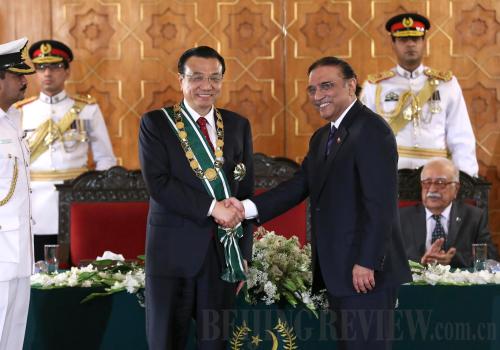|
 |
|
HONORED PREMIER: Chinese Premier Li Keqiang shakes hands with Pakistani President Asif Ali Zardari after receiving Pakistan's highest civil award Nishan-e-Pakistan in Islamabad on May 22 (PANG XINGLEI) |
Economic potential
In recent years, China and Pakistan have been strengthening their economic ties in parallel with political and military cooperation. Chinese observers believe that in seizing the development opportunity, China and Pakistan will set a new high to their traditional friendship by promoting trade and economic cooperation.
"I look forward to discussions with the Pakistani Government and public leaders to find ways to deepen the China-Pakistan comprehensive strategic cooperation in a new era, so that our two countries will be better able to meet challenges, achieve common development and lift China-Pakistan relations to a new high," said Premier Li.
"Premier Li's trip to Pakistan can be considered a new starting point to developing bilateral economic cooperation," said Li Qingyan. She noticed that as China is at a crucial period of economic transformation, Pakistan is also at a key phase of development. The bilateral trade volume does not match up with their close relationship, she said, adding that the two sides have put much thought into exploring potential cooperation.
In recent years, bilateral trade has kept growing in spite of the global economic slowdown, yielding great dividends for the peoples in the two countries. The bilateral trade volume hit a record high of $12.4 billion in 2012, up 17.6 percent from the previous year. Pakistan's exports to China saw a 48.2-percent rise in 2012, greatly enhancing the two sides' confidence about boosting economic cooperation.
Pakistan is the first country in South Asia to acknowledge China's market economy status and sign a free trade agreement with China. It is China's top investment destination and overseas contract market in South Asia. By the end of 2012, Chinese investment had totaled $25.26 billion. China is Pakistan's second largest trade partner and fourth largest export market, and steady progress has been made in cooperation in energy, agriculture, infrastructure, telecommunications and financial services.
It is expected that the two sides will reach their goal of raising their trade volume to $15 billion in 2015 ahead of schedule. Li spoke with Pakistani leaders about the formulation of a long-term plan for boosting bilateral business cooperation. "Our two sides should focus on carrying out priority projects in energy development and power generation and promoting the building of a China-Pakistan economic corridor," he said.
In spite of rapid development in recent years, there is still space for the two sides to make improvement, said Wang of Peking University. For example, Chinese enterprises' investment still focuses on infrastructure. In the coming years, China can expand investment in the Pakistani processing sector.
Li Qingyan believes power and energy shortages have posed big obstacles to attract Chinese investors. She suggested that China provide more support to Pakistan when it seeks more energy to satisfy its domestic demands. A better developed Pakistan will be in accord with China's west development policy, as well as benefiting west and central China. Li Qingyan is confident about bilateral economic cooperation, hinting the two sides will make breakthroughs on large-scale projects.
Boosting economic cooperation will also offer good opportunities for the younger generation of both countries, said Li, the researcher. She explained that as more and more Chinese enterprises invest in Pakistan, more young Pakistanis are learning Mandarin to find better jobs, while some seek training opportunities in China. "This is a good torch relay of the China-Pakistan friendship."
Email us at: dingying@bjreview.com | 